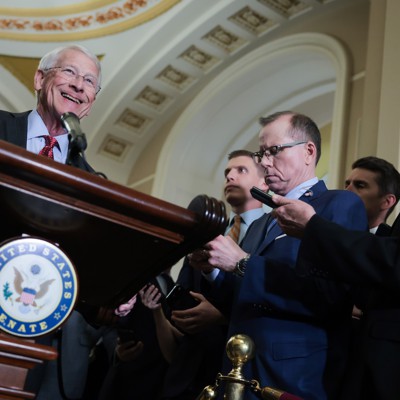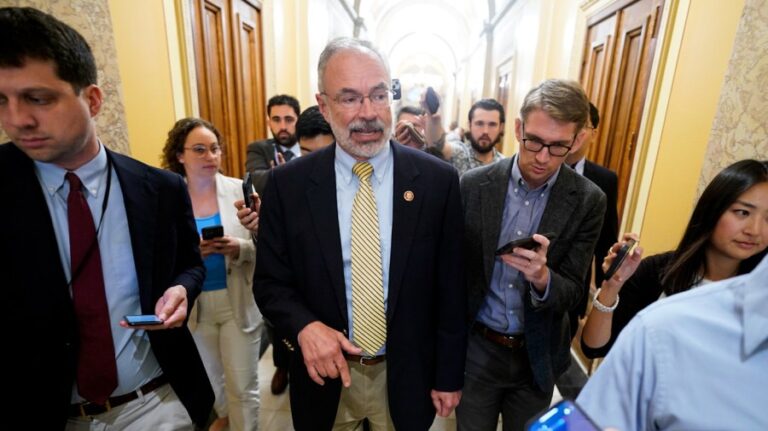The House Freedom Caucus is circulating a memo sharply criticizing the Senate-passed GOP megabill, as Republican leaders work to secure hard-liners’ votes on Wednesday. The three-page document highlights more than a dozen modifications to the bill, which were made after it passed the House in May. While some changes were necessitated by Senate budget rules to avoid a Democratic filibuster, others have raised significant concerns among conservative lawmakers.
One of the primary issues identified by the Freedom Caucus is the revised bill’s impact on the federal deficit. According to the memo, “The bill violates the House framework of $1 of tax cuts for $1 of spending cuts (with 2.6% economic growth), increases the deficit by $761 billion without interest and more than $1.3 trillion with interest after changes were made in base text and a wrap-around amendment was adopted.” The document further criticizes Senate Republican leaders, stating, “This was not what Leader [John] Thune and Speaker [Mike] Johnson promised.”
Background on the Megabill
The megabill in question is a comprehensive legislative package that aims to address various economic and policy issues. Initially passed by the House in May, the bill underwent significant revisions in the Senate. These changes were partly driven by the need to comply with Senate budget rules, which often require the removal of certain provisions to prevent a filibuster by the minority party.
The original bill was designed to balance tax cuts with corresponding spending reductions, a principle that has long been a cornerstone of conservative fiscal policy. However, the Senate’s alterations have led to a projected increase in the federal deficit, sparking criticism from fiscal hawks within the Republican Party.
Reactions from the Freedom Caucus
The Freedom Caucus, known for its staunch advocacy of limited government and fiscal conservatism, has been vocal in its opposition to the revised megabill. The memo being circulated among its members underscores their dissatisfaction with the Senate’s handling of the legislation.
According to sources within the caucus, members are particularly concerned about the long-term economic implications of increasing the deficit. “We cannot support a bill that undermines our commitment to fiscal responsibility,” said one caucus member, who requested anonymity to discuss internal deliberations.
Historical Context and Expert Opinions
The debate over the megabill echoes past conflicts within the Republican Party over fiscal policy. Similar tensions arose during the passage of tax reform legislation in 2017, when disagreements over deficit impacts led to intense negotiations among GOP lawmakers.
Experts in fiscal policy have weighed in on the current situation, noting that the balance between tax cuts and spending reductions is a perennial challenge for policymakers. “The tension between stimulating economic growth through tax cuts and maintaining fiscal discipline is a complex issue,” said Dr. Emily Carter, a professor of economics at Georgetown University. “The current debate highlights the ongoing struggle to find a sustainable path forward.”
“The bill’s projected deficit increase is a significant departure from the fiscal principles that have guided conservative policy for decades,” Dr. Carter added.
Implications and Next Steps
The criticism from the Freedom Caucus presents a significant hurdle for Republican leaders as they seek to unify their party around the megabill. With a narrow majority in the House, every vote counts, and the opposition from hard-liners could complicate efforts to pass the legislation.
Meanwhile, Republican leaders are working to address the concerns raised by the caucus. According to insiders, discussions are ongoing to find a compromise that satisfies fiscal conservatives while maintaining the bill’s core objectives.
As the debate continues, the outcome of this legislative battle could have far-reaching implications for the Republican Party’s approach to fiscal policy. The next steps will likely involve intense negotiations and potential amendments to the bill to secure the necessary support for its passage.
For now, the future of the megabill remains uncertain, with the Freedom Caucus’s critique serving as a reminder of the challenges inherent in balancing economic growth with fiscal responsibility.

























